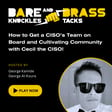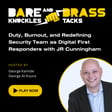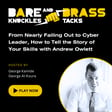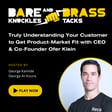Become a Creator today!Start creating today - Share your story with the world!
Start for free
00:00:00
00:00:01

Redefining Sales as a “Giving Profession” to be Proud of with Lauren Palmer
This week we step outside cyber to learn how to make sales a profession that sellers can be proud of. Lauren Palmer, VP of North America at Interlink, joins the show!
George K and George A talk to Lauren about:
- Why she believes sales is a "giving profession"
- What sales leaders can do to equip their teams for success without relying on high pressure tactics
- What objectives really matter when measuring sales success
- Her mission to transform the operation and perception of sales
Transcript
Introduction: Sales as a Giving Profession
00:00:00
Speaker
When you actually boil down what sales is, it's an extremely giving profession. It's it's all about assisting buyers and it's all about helping them solve problems and needs. So it's it's definitely a giving back profession where you really want to understand your buyer's world, the issues, the challenges that you're facing. How I see myself is like a sophisticated consultant. Let's position ourselves in a different way.
00:00:29
Speaker
I'm not trying to sell you something that I don't think is of value to your business.
Podcast Introduction: Bare Knuckles and Brass Tax
00:00:40
Speaker
Yo, yo, it is the show. This is Bare Knuckles and Brass Tax, the cybersecurity podcast that tackles all the human bits in the industry, trust, respect, and all the rest.
Transforming Sales: Lauren Palmer's Perspective
00:00:51
Speaker
I am George Kay with the vendor side recording solo because most of this episode was recorded in bits and pieces on the road.
00:00:58
Speaker
Today's episode is with Lauren Palmer, Vice President of Sales at Interlink, and she is a recent transplant from London to New York. She is not in cyber, although Interlink counts cybersecurity companies among their clients, but we really wanted to talk to Lauren because she has an entirely different and very refreshing take on how to progress the sales profession, a profession that she calls a very giving profession,
00:01:27
Speaker
and transform the perception and the practice from one of the sleazy tactics we've talked about here, the high pressure tactics we've talked about here into something that sellers can be proud of. Lauren Palmer, welcome to the show.
Lauren's Career Journey into Sales
00:01:42
Speaker
Thank you so much. Delighted to be here. Thank you for inviting me. Lauren, I'll start off with us for today. um First question, given how doggy dog the world of business development is, particularly in IT, when and how did you know a career in sales was actually right for you?
00:02:02
Speaker
That's a good question, isn't it? I mean, I often say that um sales found me rather than I found sales. um But to be honest with some of the work that I'm doing that I'm sure we'll cover later, I'd like more people to be actively finding sales and see it as a desired profession. and even when you mentioned dog eat dog world, that's, that's a terminology. I really want to avoid people thinking about this industry where it's scary and it's aggressive and it's super competitive. But to answer your question with regards to me as an individual, um, I guess in a way I was kind of, it was a bit of an all rounder at school.
Keys to Success in Sales
00:02:40
Speaker
I wasn't really a specialist in anything, but, um, I was, um, big into my sports. I had a sports scholarship for my school, which I think drives the,
00:02:49
Speaker
competitive element in me that still hasn't gone i am running a half marathon tomorrow who knows why haven't trained but let's give it a ah go in my new my new home in new york city um so i think sport i had a love of psychology really understanding people.
00:03:09
Speaker
Um, and actually that's what I took in forward into my degree. I studied psychology in English literature. So really understanding people, but also being able to articulate yourself really well. I think that's a very powerful skill to have in sales as a profession.
00:03:26
Speaker
Um, and yeah, I think overall I was big into acting and theater and performance and let's face it, you know, in sales, we do a lot of presenting and being able to convince someone of a particular product and solution. And in my role now, you know, I don't always go in thick and fast about product. I talk about industry trends and what's going on in the market.
00:03:53
Speaker
And ultimately that does come from being able to hold yourself well in a presenting setting and consistently add value to clients.
Changing the Perception of Sales
00:04:01
Speaker
So lots of different areas that that drove me to sales, but certainly an area I feel very, very comfortable in and a profession I'm really proud of actually.
00:04:12
Speaker
No, we don't hear that often. So good on you. Exactly. Yeah. So so this is the bare knuckles portion of the show, which tends to be the airing of grievances. um You brought up. Dog eat dog, this notion of aggression, trying to dispel that. I wonder if you could talk a little bit about why you think sales has a quote unquote bad rep.
00:04:39
Speaker
I mean, I know why I think it does, and I was on the marketing side and and certainly George has his opinions, but to hear it from a sales leader and somebody who is also trying to actively change that perception, I think that would be valuable for our audience.
The Rewarding Nature of Sales
00:04:54
Speaker
Absolutely. And one of my missions and my goals is for more people to stand loud and proud about sales being, in my opinion, one of the greatest professions in the world. It's super rewarding as well.
00:05:07
Speaker
And ultimately, sales makes the world go round, right? Revenue generators are the reason that companies can scale, that we can offer more jobs, that economies can scale. um You know, without revenue, without sales, companies simply can't operate. But what I hate is that there's still in this industry, this like overt stereotype of this typical sales professional. And really, I mentioned a few of those words, like aggressive and assertive.
00:05:36
Speaker
maybe even words like dishonest. um I think there is often these associations of a really highly masculine environment. So kind of in a way sort of conjuring up those Wall Street vibes and the old boys
Challenging Sales Stereotypes
00:05:50
Speaker
clubs. And, you know, like I said at the beginning, when you actually boil down what sales is, it's an extremely giving profession. It's it's all about assisting buyers and it's all about helping them solve problems and needs. So it's it's definitely a giving back profession where you really want to understand your buyer's world, the issues, the challenges that you're facing. How I see myself is like a sophisticated consultant. Let's position ourselves in a different way. I'm not trying to sell you something that I don't think is of value to your business. I'm trying to help you solve a problem.
00:06:29
Speaker
I'm trying to continue to be a valuable asset for your business and bring in things like expertise and knowledge and creativity to help support outcomes for that particular buyer. So I guess in a way, like, why do I think it's still happening? I genuinely think that there is.
00:06:50
Speaker
ah bit of a systemic cultural issue in the way that sales teams are targeted in these like high pressure environments, you know, that demand delivery on these really high revenue targets week after week. And the way that maybe they're trained is this kind of constant appeasing shareholder value. And I do think it comes from
Critique of Sales Pressure
00:07:11
Speaker
the top. I do think that um It's how you are trained as a team and and how you're executing on being a high performing sales team that ultimately will translate into the support that you give your customers. I think that you know businesses in a way, they're so hellbent on scaling fast.
00:07:33
Speaker
um so What I've often seen in my career is that sales teams can be just trained on these like high volume plays. It's all about spray and pray. It's driving as much outreach as possible. It's closing so many deals as fast as they can. And I think as well, you know, it's sales can be a very um financially rewarding job as well. Um, but I think that can come with negatives too, where you're put in a position and there's this expectation that you have to deliver quickly and fast.
00:08:03
Speaker
And actually that's not gonna drive the most success for a business. So I think there's ah there's a lot of work to be done in that space, both from a leadership level and from a ah culture standpoint as well.
00:08:14
Speaker
This is just so refreshing. And I, as the person who is always harkening back to my background in cultural anthropology, could not be more pleased that you bring up culture. There's a lot there. We're going to come back to some of that. But um I'm glad that you brought up um revenue targets in particular and and leadership, which I think we'll touch on in the second half of the show. Yeah, I think i think it's funny. You're talking about aggression. And um I kind of want to stay on that for one second before we go to the next topic. but You know, there's a certain culture still you talk about the old boys culture and there's like a I Really think of it like like a like a car salesman type approach where you have these young Hotshot kind of sellers who have a certain type of way about them and and George, you know the guy that we always make fun of that was like that Maria initially met remember him and
00:09:09
Speaker
There's there's a seller that I'm thinking of. um ah George and I always kind of poke fun at how ridiculous he is. And and and our friend Maria Graham actually ran into him at a conference and he was very much kind of a kind of a douchebag to her and generally in his behavior.
00:09:26
Speaker
um And you know, we see this guy and we saw him, I think even at RSA and it's just like there are guys and gals or definitely women like this too, who just, you know, they're extremely well-dressed. They have like a hyperconfidence to them. There's a chip on their shoulder, but there's also just like a sincere ingenuity.
00:09:49
Speaker
or I shouldn't say ingenuity, in sincerity to how they present themselves. And I think it goes against this idea of a seller as ah as a consultant who's trying to provide value.
Leadership's Role in Sales Culture
00:10:03
Speaker
Because all they're looking at is, are these are prospects who I can now mark on to meet my quotas because my goals are the more important thing.
00:10:13
Speaker
how do we defeat that culture? Because I think that's the the toxic thing in sales that a whole generation of people seem to want to embrace, like almost in the same way that people would look at Patrick Bateman in American Psycho and and try to idealize that character. You know what I mean? Like that kind of weird sort of thinking.
00:10:32
Speaker
oh but So I think um and when it comes to personality and the way that you hold yourself, um maybe there's a few ah few people in the industry that like spoils it for the rest of us who are trying to act with authenticity and are trying to act with integrity and are trying to do the right thing. So it's always a shame when I hear that people are ah acting in this kind of arrogant fashion and not not doing the right thing by their clients, because again, it just spoils it for the rest of us who are trying to do right. um But to answer your question, I do think, and I mention it coming from leadership and the way that quotas are assigned, because let's not forget that as a sales professional, you are assigned a target that sits over your head. And your goal is to hit that target and to build revenue towards that that particular goal.
00:11:26
Speaker
Now, where I've seen it fail is where leadership are setting those quotas and targets on a particular products, for example. So if you're a business that has maybe five or six different product suites and you have quotas against each, what that can mean is you're pushing square pegs into round holes. Your job is to make sure that you're fulfilling your quota allocation on each of those different business units, rather than what's doing right by the client.
00:11:54
Speaker
so Certainly within the business that I work in, a company called Interlink, um we actually um operate. I mean, we're a privately run company. Culture is huge for us. We're actually a company that offers a four day work week for global employees. ah We have absolute flexible working for all of our commercial teams, but we also are a business where we work hand in hand lockstep with the board.
00:12:23
Speaker
to define the numbers and the expectations of what we think that we're going to be able to deliver on in that year. And what that means is we're all working in harmony. We're all working together. um And, you know, the business isn't then over predicting of where they're going to land. Actually, it's a very collaborative process on this is where I think we can get to. And in turn, that helps them understand well where can they invest.
00:12:50
Speaker
I think sometimes businesses can scale and invest in these big teams too fast. And that's when they require the revenue to flow in thick and fast, which can come in from all different angles and they don't care the way that those people are holding themselves to get that business. So again, I think it's a shame.
00:13:09
Speaker
There are so many wonderful examples of phenomenal sales professionals that are doing it right. um even I don't even like sometimes using the word sales. I see it as partnerships focused. And then I think it really comes down to the quota and the leadership in terms of how they're motivating that team to hit those goals.
Building Authentic Sales Relationships
00:13:32
Speaker
Awesome. That sums it up perfectly, actually. And I appreciate the candor and that answer. I'll switch it over to kind of a different line of thinking here. and More positive. New job, new country, new year, 2024 has been like big for change for you. What are some challenges you've had to learn to overcome as a result of making so many big moves in such a short period of time?
00:13:55
Speaker
Oh my gosh, so many big moves. I also got married this year. So that was good God, Lauren yeah i trying to squeeze all the, all the life change into one tiny period. of god Ridiculous. I know. Everyone always says you don't do things in halves, Lauren. and Um, what is my advice? I would say it's definitely, um,
00:14:17
Speaker
In a way, like letting go of the past, I think when you start a new job um and you've worked in leading high performing sales teams in multiple different businesses, you sort of have a view of what you think is right.
00:14:32
Speaker
Um, and I think it's all about letting go of that and actually starting a new company with a fresh queen slate, really understanding how do they work, reflecting on maybe what didn't work for you in the past and, and trying to use that to to channel you forward. And I think it's the same.
00:14:51
Speaker
when you move country. And I've had to check myself a few times. You're constantly comparing to what you know. It's like the nostalgia of the past. It's like, oh, it's not like that in London. um So I think it's sort of letting letting go and really embracing the change and yeah, allowing that to to push you forward, really. Don't hold on to the past.
00:15:42
Speaker
All right, i it was still recording on my side, but I'll say it again. So you talked a little bit about sales as a giving profession, which is definitely the first time we've ever heard that on this podcast. So I was wondering if you could talk a little bit about. Being vulnerable from the sales side, right? Maybe a contrast to the Wolf of Wall Street bravado and. You know, posturing of Uber confidence like.
00:16:10
Speaker
Where does that play in either the sales talent that you're recruiting or how you're managing your sales teams or even in interactions during a sales process? Like what, what is the power there of, of sellers being vulnerable?
00:16:31
Speaker
sinn and i um Because I think it, it ties back to, to people buying from people. um, and vulnerability and being authentic and honest and operating with integrity is fundamental to being a successful partner. Um, I've absolutely always acted with vulnerability right the way down to, you know, if my customer says that they want to run a campaign in a specific way, but I know that's not
00:17:03
Speaker
not what I'd recommend or potentially that's not something our business can do. um I will always be honest and either challenge them. I think, um you know, getting, trying to challenge your clients to think differently, maybe trying to unpick a little bit about why they think that's the right approach um or just being absolutely brutally honest that we're not the right business for you. And I must say that we do that a fair amount where some of our customers have these dreams of what they want to achieve. And in practice, they're super difficult. I work in in digital marketing. They're super difficult to execute. And we'd much rather say no now, suggest an alternative.
Sales as a Value-Based Partnership
00:17:50
Speaker
And even if they say no, I
00:17:52
Speaker
It's highly likely. And it's happened to me multiple times in my career where they come back because that difficult execution they've then had to live through. And they've realized that perhaps there is an alternative and a different solution for them out there. So it's interesting the because it, it, it actually like hurts my heart when you say that's the first time we've heard sales as a giving professional Nicole, because all I feel I do day in and day out is.
00:18:21
Speaker
help people, I will keep on top of what's going on in the market. I will send through interesting articles of relevance. I will think about a strategy. I will work with my clients who are marketers at big tech companies, big cybersecurity companies. Those are our largest clients. I'll understand how are they being, how are they being measured in terms of their performance? What are their KPIs? What are their metrics?
00:18:49
Speaker
What are their biggest challenges? And my job is to listen, to take that away and to come back with ways that I can help them is to be really creative and proactive with with ideas. So yeah, it pains me to think that people don't see it like that because there's just so much that goes on behind building a really, really successful partnership.
00:19:15
Speaker
Yeah, that is, uh, that's pretty much the best answer we've ever heard. Yes. I want to build an army of people who have the same goal as me, which is to change the perception of a salesperson.
00:19:32
Speaker
because we do things, when you do things properly and you do things right and you deliver programs, like again, I will say one of our biggest clients in the cyberspace and they come back to you and they say, we've seen our biggest return on ad spend from the program that you have run. I mean, again, that goes back to the, just the rewarding nature of this job. Absolutely brilliant.
Break and Transition
00:19:57
Speaker
All right. Well, we will take a short break and we will be back for brass tacks.
00:20:16
Speaker
And we're back. It's time for the brass tax portion of the show. And this is where we focus more on being solution oriented as we do not believe in admiring problem.
Cyber Industry Sales Strategies
00:20:27
Speaker
ah So Lauren, I'd like to start off by asking you what kind of lessons can cyber sellers learn from sellers in other industries? Going back to what I was saying about like what makes a good salesperson, like we're all We're all here to do the same thing, which is to deliver on outcomes. Um, so how have I been successful in my career that can support maybe cyber sellers or any seller and in a different industry is, um, again, being very metrics driven in terms of how I support my customers. So, um, less about going in and talking about your product.
00:21:08
Speaker
um But very much being a curious um ah curious person where you're really trying to get under the hood of who you're selling to, what makes them tick, what keeps them up at night, what are their pain points, and then ultimately how you can um support them. So again, it goes back to that measurement piece, which I just think is so, so important. um One of the ways I've been very successful in my role is when you understand measurement,
00:21:38
Speaker
for the person you're speaking to, because we have to factor in when we're selling as an expanded buyer group, right? You've got multiple different decision makers that you're having to influence along that whole process. That's the same for any industry. um So what you're trying to do is understand for each individual, why is your product going to be valuable and important to them? um So I would definitely, recommendations is to start thinking about building business cases that are personalized to each buyer to really reinforce the value it can offer them. Because I think we tend to go in very blanket. um Again, it ties into that negative spray and pray approach where everyone's trying to send the same message to every single person, but forgetting that every individual that you're selling to is extremely unique, has extremely different demands.
00:22:32
Speaker
you can really tie into that and build a strong business case that you put forward, that is where you're going to win. so So really it comes down to kind of how you logic out and approach and the, I won't say the problem, but the opportunity of engaging with a prospect,
Personalized vs. Generic Sales Approaches
00:22:50
Speaker
right? So you're you're trying to talk about We need to change our fundamental logic before we begin engaging with the prospect, before any of this, like, you know, let's talk about demos. Let's talk about, you know, pricing and that kind of thing. Like it's, you're taking it right back to the start, you know? Absolutely. Um, my job is as my clients are cyber sellers, my clients are technology vendors. We always talk.
00:23:19
Speaker
And we spend a lot of time digging into really, truly understanding that ICP, truly understanding who makes up that buying committee that all of those sellers need to influence. And again, that ties into their pain points, their challenges. And we we differentiate it between your target buyers and your hidden buyers. Your target buyers are the ones that ultimately hold the purse strings that ultimately the final decision makers.
00:23:46
Speaker
from a technology standpoint, they're probably the people that you can have you know um technical conversations with about implementation and existing tech stacks. Whereas maybe your hidden buyers are your wider, usually I would say to tech sellers, your your business decision makers who need to know about your company, need to see value in your company, need to see a strong brand image around your company, but it's a very different angle with them.
00:24:15
Speaker
right If you go in hard and fast on products and demos and trials to to some of the business decision makers involved in buying, that's not going to generate the right response. so A lot of the work that I'm doing now, I'm actually doing a ah talk back in London um at a ah big B2B marketing event, which is all about the importance of hyper-personalized outreach to that expanded buyer group. No more generic messaging.
00:24:41
Speaker
that's constantly plugging product, but actually really considering the needs of each individual and and tailoring your messaging, and also what content you deliver them at the right time, depending on who they are.
Managing Sales Targets Effectively
00:24:55
Speaker
and We talked about revenue targets. I really like how Interlink does that. Not every company plans that judiciously, I would say. But in terms of brass tacks, curious if you have Any advice for other sales leaders who are managing sellers through their sales process, kind of the operational rhythm. I think we see a lot of frustration and a lot of desperation when people feel like they're nowhere near those targets or they're trying to rapidly fill pipeline. The thing about sales is that like so much is out of your control, right? Like you could have a really great meeting, a really great interaction. You feel all this traction with an account and you feel really excited about it. So you drop the prospecting and other stuff.
00:25:37
Speaker
And then suddenly that account has like a budget problem or something out of your control slows things down and suddenly you're in the headlights. You're not going to hit the number. Anyway, I think that's where a lot of the stress and desperation comes from. So curious from a sales leader perspective, how you're managing sellers through that part of the profession.
00:25:57
Speaker
Absolutely. So as a sales leader perspective, obviously my job is to hand out those dreaded targets to the individuals and ensure that they're delivering on those. um One of the things that I will always do is to work with the seller to understand where do I think the opportunity is to drive that sort of revenue.
00:26:21
Speaker
I've seen it in businesses far too many times where targets are handed down and there is absolutely no support, guidance or explanation as to where that revenue is going to come from. Now I'm in a privileged position, I understand that, at Interlink where I've worked with the board to submit my numbers with an idea of where I think that could come from. However, what I would say is I would sit down with that individual and again try and move them away from this generic spray and pray approach to drive mass volume generic outreach that isn't going to create a very good impression for the brand.
Structured Sales Approaches
00:27:01
Speaker
And I would work very closely with them to look at a sophisticated and target execution of an ICP that we have defined um and essentially create my own ABM strategy with them. Now,
00:27:17
Speaker
That allows them structure. The problem with sales is if you give yourself too many clients and too many prospects, personalization goes, you have no idea how to structure your day. um And that's when you can feel very overwhelmed quite quickly. The way to not feel overwhelmed in sales is to define your ACP, understand the expanded buyer group,
00:27:40
Speaker
understand where you think that opportunity will come from and then split up your week and your days, um, by that. So for example, I, I mentor, um, some, some young people who are moving into sales and I will always say, have a look at who are your key accounts, who are your big bets and who are your small wins, which companies, and you should understand that if you understand your industry and you understand your ICP. And you've got that guidance from your leader about where an opportunity could be. You should be able to quite easily structure your week and dedicate the right amount of time to those companies. If they, if for example, they don't, that company then has a budget issue, you would then, in my opinion, report that back. You have explicitly stated to your manager where you're spending your time, report that back, and then refocus.
00:28:35
Speaker
You know, sometimes we we come up with these challenges, budget might come up at a later date. I would certainly say, don't forget about that company either. Consider keeping them, keeping front of mind, sending them educational content about the industry that's going to support them. um But it's all about discipline, structure and focus, working hand in hand with your manager and being very um communicative throughout that whole process of where each account is at what time, because that's when the pressure of sales goes. I don't feel under pressure if I can clearly articulate where I've been spending my time, why, and what the outcome of that time has been.
00:29:17
Speaker
Awesome.
Introducing WISE: Women in Sales
00:29:18
Speaker
So I want to take ah time to do this just as the last question, but I want to give you a full platform for this. Talk to us about your work with WISE. What is that about? What is going on with that? I was checking out the website for it this week. It looks really cool. You already got this going. You just moved to New York. What is going on with WISE?
00:29:39
Speaker
Absolutely. Thank you for the the little plug there. So, Y stands for um Women in Sales Empowerment Network. um So one of the things that I've noticed throughout my career is that this certainly is still a very heavily male dominated environment.
00:29:58
Speaker
And I think so certainly when you factor in leadership, sales leadership, um, throughout my career, it's often been me sitting in a room, um, with lots of incredible, by the way, male leaders. But I think there is a lack of female sales leadership role models that aren't attracting enough women into. And I will say it again, this amazing field. So wise for me, um, was it's born out of love for sales, um, and is a community to.
00:30:27
Speaker
um entice women into ah the profession to create a real vibrant community where, you know, women can really support each other, can inspire each other, can empower each other. But, you know, the goal for me is to build this community that can mentor and can support, but also that is designed to change the perception of this industry.
00:30:53
Speaker
um I want more people talking about the value that we bring, not the negative connotations that we have. So right now I'm focused on women because I feel that there is a lack of women in this space. And the more and more I talk to my network about it, the more people are saying that less women are applying for sales roles. But I will say that this community, I want to advance to be inclusive of anyone.
00:31:19
Speaker
um That feels as passionately as I do about the value that sales can bring um especially to customers and partnerships So within wise are you guys planning on running like like actual ah live events in person? Is it gonna be virtual? um Let's say, you know, I'm someone interested I sign up. What's that process look like?
00:31:42
Speaker
Yeah, it's a really good question because there are quite a few groups out there and each group offers so many different things. Some groups have a cost involved. Some groups have mentorship opportunities and events. um Mine is more, I'm positioning more as a a community. it is It's free to be involved.
00:32:01
Speaker
The initial way to get involved is um there is a QR code on the website that you can scan and we will just um make sure that you know you are within the industry, you are who you say you are and that will actually have you as part of a ah WhatsApp group.
00:32:16
Speaker
And the reason I've done that is because WhatsApp's actually really powerful to very quickly and easily share information to each other globally, to offer advice and support. And naturally there, things come up like, are you attending this event? Or, Hey, um I've got an amazing sales rep that's looking for a job opportunity. Does anyone know?
00:32:37
Speaker
what's available at the moment, and people are very active within these groups. So this is just the start of my journey, but I'd say if you want to get involved and you feel the same as I do, jump into the WhatsApp group, let's start sharing, and then let's build it from there. I want to see where we can take this. You know, there's no massive commitments, we're all busy professionals, um but it's just a place that you can be, yeah, be comfortable, be around people that inspire you, and really try and change change the industry a bit.
00:33:06
Speaker
That is
Transforming Sales Perceptions
00:33:07
Speaker
awesome. So we are going to post a link to that with the episode when we released this. ah It'll be ah posted up on LinkedIn and the episode itself will be on Spotify and on Apple pods. um But Lauren, thank you very much for joining us this morning. It was really, really cool. We had been waiting for months to have this interview. And, um you know, I just I am amazed at the quality of thinking and the quality of content that you've given us in our readers or our readers are listeners. Sorry.
00:33:40
Speaker
um We're trying to do things better. And we were talking about that in the emails and the correspondence in advance. And I think you really embody kind of this real progressive next generation style of thinking about the approach to sales, where we're focusing on the actual relationship and filling out customer needs and providing real value, not this um generic blast by approach. um It is music to our ears to hear that. So please keep up with your mission. Let us support you however we can. Thank you, Lauren, for coming on the show. It's been a pleasure.
00:34:19
Speaker
um Lauren Palmer, welcome back to the show. It turns out that you had a spark of inspiration after our last chat. So before we went to air, you reached out, you wanted to reflect on some of the ideas we went through in the recording. ah So we are meeting again almost a week later. And so I just want to give you the space to talk about like what came to you, what was the Eureka moment, and what would you like our listeners to take away?
00:34:49
Speaker
sure. And thank you so much for having me back, guys. I loved our chat so much that I got extremely passionate. And it it really made me think about sales as a profession. And, you know, I mentioned it many times. It's it's an area that I'm really proud of doing. I love my job. um I love working with my customer base. I love building partnerships. But one of the areas that I saw was just there was a lack of a lack of women coming into sales as a profession. Certainly, from my experience, there was a lack of female ah sales leaders. um And that's why i I thought about starting my own community, a community that's built to entice more women into this amazing field. But after our conversation, I reflected and I thought, why does this have to be specific to women? Actually, what I think the fundamental problem here
00:35:40
Speaker
is this negative perception of sales as a profession. So I'm extremely passionate about advocating for women and I want more women to come into this field, but I want this to be much more inclusive than that. So I'm grateful for you bringing me back on because where my mind is going is is really about building a vibrant community And I want that community to be inclusive of everyone, but ultimately the goal is to transform the perception of sales, right? I want to empower sellers to be really proud of what they do. And I'd love to eventually start looking at, you know, building comprehensive training for success. So right now, I guess my shout out and again, thank you for asking me to come back is
00:36:30
Speaker
If there is anyone listening here that is resonating a lot with what I'm saying um and is interested in joining me on this journey, you know, right now it's deep research. It's having good conversations. Please reach out. You know, this can be anyone from sellers who feel fed up like me of having eyes rolling when you tell them what ah tell people what you do, or maybe there's brands out there who really want to go into collaboration to support ethical selling practices, you know, where my mind was going was even right the way back to school, being able to educate young people on the value of sales ah as a profession. Let's start that much earlier. So if anyone works in a school and thinks that could be valuable to bring to children, I definitely think that that will entice more more people into the
Restoring Respect in Sales
00:37:19
Speaker
profession. So big shout out anyone who's resonated with anything from this episode, I'd love to have a chat.
00:37:25
Speaker
Yeah, Lauren, thank you very much for that. um I really think what you're trying to do is bring respectability back to the sales profession. There has been a complete breakdown of the reputation of salespeople that I think is unfair because, you know, as a practitioner and as a buyer with buying authority, I need my sellers. I need my sellers. I have such a critical relationship with them. I can't run my operation without them.
00:37:50
Speaker
But the fact is that most sellers, that the you know the ones that haven't achieved that level of trust with a particular buyer, we are are disposed to look at you like lesser than. We are disposed to look at you like you're only something I need to deal with if I actually need anything from you. I don't want to deal with you. You annoy me. You're you're not worth my time. You're inauthentic. You're all these things.
00:38:16
Speaker
I think what you're trying to do, Lauren, will destroy that bias. It will smash through it. And if we can do that together, maybe we can make this a better conversation for everyone. And i I can't think of a better time either. I have spoken with a lot of new sellers.
00:38:34
Speaker
And I have also spoken with a lot of our listeners in DMs on LinkedIn. And a lot of them are feeling this tension in the culture between what they are as a person and what they are trying to work within. And I think they have a natural proclivity to build relationships and stuff like that, but they're running up against some of the hardcore numbers driven stuff that we talked about in our last recording that's putting pressure on them and what in ways that they're uncomfortable behaving like I guess I gotta go call a bunch of randos and you know this that and the other and so yes there is a
00:39:15
Speaker
I think this is a great time. um So I applaud you for it because I think what you're trying to do, if I understand you correctly, is change the culture of selling from within. So you said ethical sales. Love it. Culture is hard. ah But also if you can do that, you change the cultural perception right from the outside of sellers. So what I'm saying is thank you for setting such a small goal for yourself. Right.
00:39:44
Speaker
um But yeah, very, very worthy endeavor. Yeah. I really appreciate both of your support. I think as you rightly say, it's it's extremely topical. Let's start from ah the practice of selling as an individual. Let's consider the culture of selling from businesses and then let's, you know, show the world and and young children that this is an incredible profession
Conclusion and Call to Action
00:40:05
Speaker
to be a part of. So thank you for all your support. I really appreciate it.
00:40:09
Speaker
Absolutely. Well, we will hope to check in with you later as you build this, but thank you for coming back on the show. Thank you so much.
00:40:22
Speaker
If you liked what you heard, be sure to share it with friends and subscribe wherever you get your podcasts for a weekly ballistic payload of snark, insights, and laughs. New episodes of Bare Knuckles and Brass Tax drop every Monday. If you're already subscribed, thank you for your support and your swagger. We'll catch you next week, but until then, stay real.



















